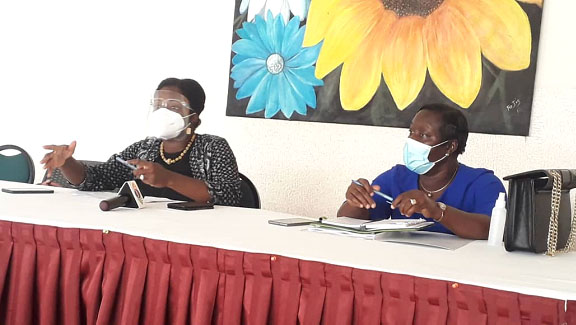Kosi Yankey-Ayeh (left) addressing participants at the meeting
APPLICANTS OF the Coronavirus Alleviation Programme Business Support Scheme (CAPBUSS) who are reluctant to access their stimulus from their respective financial institutions have a three-week ultimatum to do so before losing their funds, the Executive Director of National Board for Small Scale Industries (NBSSI) has disclosed.
Kosi Yankey-Ayeh explained that the ultimatum issued was to allow for the organisation to conduct a thorough process of reassigning inaccessible funds to other applicants who were in dire need of support.
“As much as possible, we will be grateful if they can go and finalise the process and take the fund. Some say they don’t want the money anymore, some will say ‘I didn’t apply for the money,’ even though they are in the system,” she said.
Mrs. Yankey-Ayeh gave the announcement in Accra on Monday when she interacted with heads of some business associations that included the Ghana Chamber of Entrepreneurs with Disabilities and the Social Enterprise Ghana.
Discussions were focused on how to solve technical challenges associated with loan application and disbursement processes.
It was revealed that most applicants had challenges with accessing their loans as a result of inputting wrong data such wrong Tax Identification Number (TIN), code or mobile money number.
The NBSSI is dealing with business owners belonging to some 150 associations that form a majority of 900,000 applicants who applied for government’s intervention through the CAPBUSS initiative.
She indicated that beneficiaries who received amounts less than GH₵2000 would be categorized under the grant component of the initiative and so would not be required to pay up.
Meanwhile, she reiterated the need for beneficiaries of loan packages to pay up after the one-year moratorium so as to qualify them for better packages that would be rolled out by the agency in future.
Speaking in an interview, the National Chairman of the Ghana Chamber of Entrepreneurs with Disabilities, Alexander Tetteh, expressed his gratitude to the government for such an initiative.
He noted that the engagement with NBSSI had been fruitful as it had helped dispel misconceptions regarding the disbursement process.
“With the explanation given here, it came out clearly that there were some challenges as far as data provided and was concerned.
“We were actually not in normal times during that time and the filling of the forms was in a hurry and I am sure that was why a few of them made some mistakes here and there,” he said.
By Issah Mohammed


